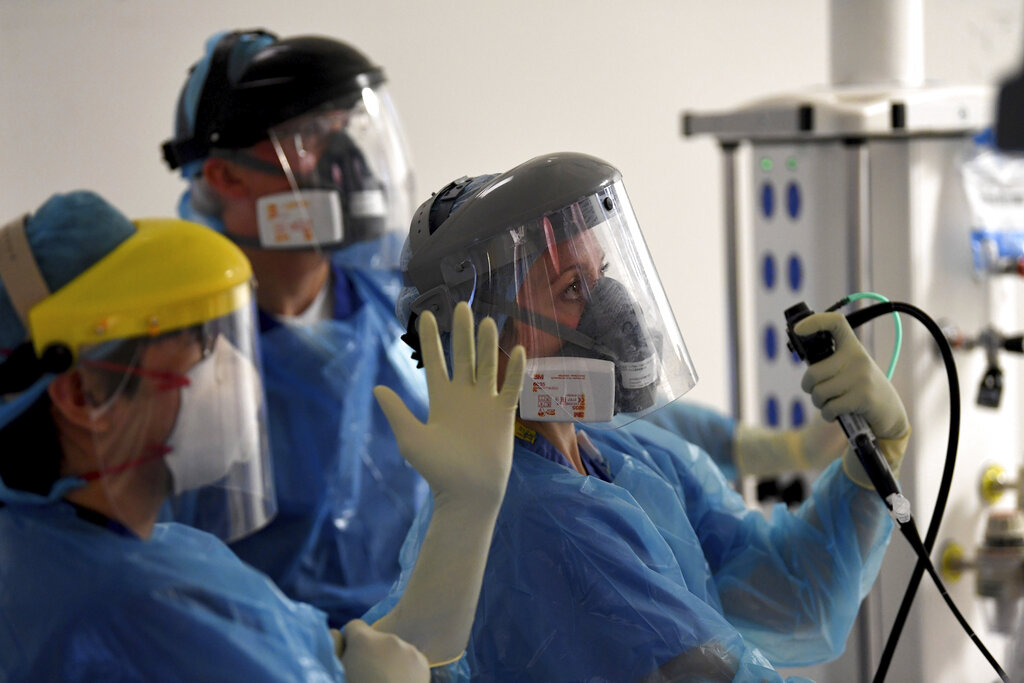ADF STAFF
Jose Dos Santos was desperate for oxygen after battling COVID-19 for three days. His wife, Dominique, drove him to Midstream Mediclinic just south of Pretoria, South Africa, where she was told Jose had a 5% chance of living.
After Jose lost consciousness, he was transferred to the intensive care unit. That’s where Dominique met Dr. Emmanuel Taban, once a homeless refugee from Sudan’s civil war, now one of South Africa’s few pulmonologists, a respiratory specialist.
Taban told Dominique he was going to perform a procedure known as flexible fiberoptic bronchoscopy, a technique that removes mucus from patients’ air passages to help them breathe. The revolutionary COVID-19 treatment worked.
“That day, I knew that what Dr. Taban had done had brought [Jose] back to us,” Dominique told Carte Blanche, a South African news program. “Within five days he was off the ventilator and able to breathe on his own.”
“The new intervention and new procedure did save my life,” Jose added.
Taban’s work on critically ill COVID-19 patients — and his inspirational rise from a past marked by homelessness, despair and persecution — has gained notoriety across Africa and beyond. New African magazine recently named him one of the continent’s 100 most influential people, alongside the likes of South African President Cyril Ramaphosa; Tedros Adhanom Ghebreyesus, director-general of the World Health Organization; and Nigerian music star Burna Boy.
Born in a tiny village in South Sudan, Taban told Carte Blanche that his childhood was happy, until violence displaced his family. South Sudan’s military arrested him when he was 14 and accused him of being a rebel spy. He was thrown into National Security Service prison in Juba. The facility, also known as the “White House,” is notoriously inhumane.
“I spent about six weeks in the ‘White House.’ That’s when I got tortured. It was a very horrible experience,” the soft-spoken Taban told Carte Blanche.
He fled to Eritrea after his release. He was briefly detained for entering the country illegally and lived on the streets for two years. He eventually crossed into Ethiopia before traveling 2,800 kilometers by bus and on foot to an uncle’s home in Kenya. Taban was devastated when his uncle turned him away and told him to go to a United Nations refugee camp.
“I was crying, I was angry,” he told Carte Blanche. “That’s the moment I decided I needed to find my own identity. I knew I was alone in the world and had to face the reality myself.”
He was inspired to travel farther south after reading “Manufactured in South Africa” on a Coke can. Throughout his journey, he was driven by an ambition to pursue medicine after a nurse once told him he would someday become a doctor.
“The possibility of being able to survive beyond childhood was difficult to imagine — let alone being able to go to school,” Taban said in a story on goodthingsguy.com.
In South Africa, he befriended two South Sudanese missionaries who helped him pay for studies at the Medical University of Southern Africa, the University of Pretoria and the University of Witwatersrand. He studied pulmonology in the Hermes university system in Europe and earned a diploma in endobronchial ultrasound and lung cancer staging at the University of Amsterdam, according to Voice of America (VOA).
No longer alone in the world, Taban and his wife, Motheo Phalatse Taban, a physiotherapist, have three children.
Asked by Carte Blanche what she loved most about her husband, Motheo said: “He is so driven. The ambition, the passion he has for his work and the compassion with which he treats his patients.”
Those traits are matched by the love and concern he has for South Sudan, where he hopes to someday help build more schools.
“We need to make sure that the children of South Sudan hear [my] story that there is a child who used to be homeless, who used to beg for food on the streets, [but] has done something great in the world,” Taban told VOA.

